Unit 2 Making a difference Using language课件(共46张,内嵌音视频)2024-2025学年高中英语外研版(2019)必修第三册
文档属性
| 名称 | Unit 2 Making a difference Using language课件(共46张,内嵌音视频)2024-2025学年高中英语外研版(2019)必修第三册 |
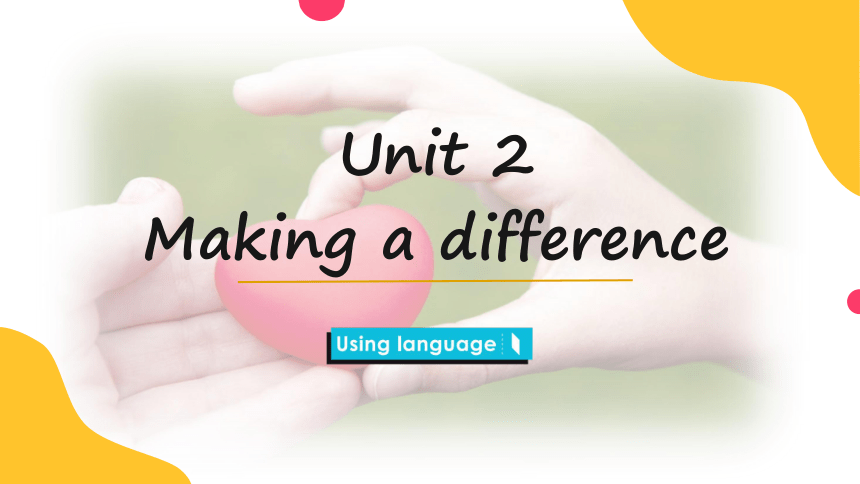
|
|
| 格式 | pptx | ||
| 文件大小 | 8.6MB | ||
| 资源类型 | 教案 | ||
| 版本资源 | 外研版(2019) | ||
| 科目 | 英语 | ||
| 更新时间 | 2024-12-24 19:23:59 | ||
图片预览

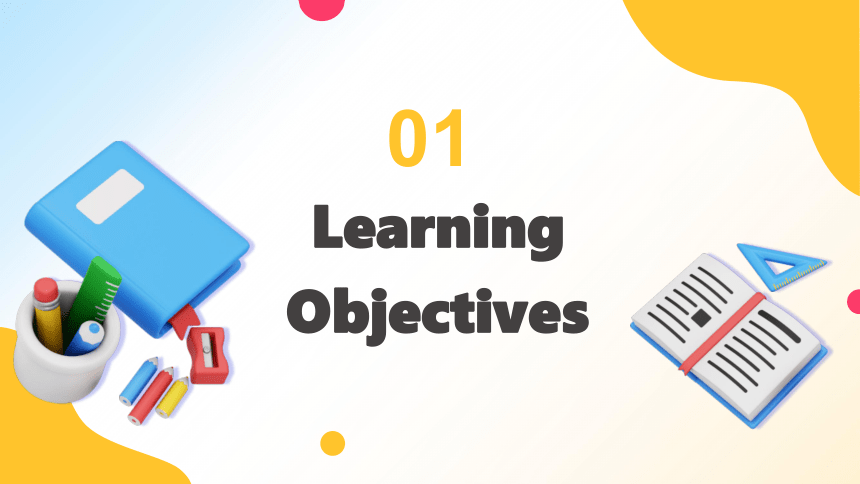
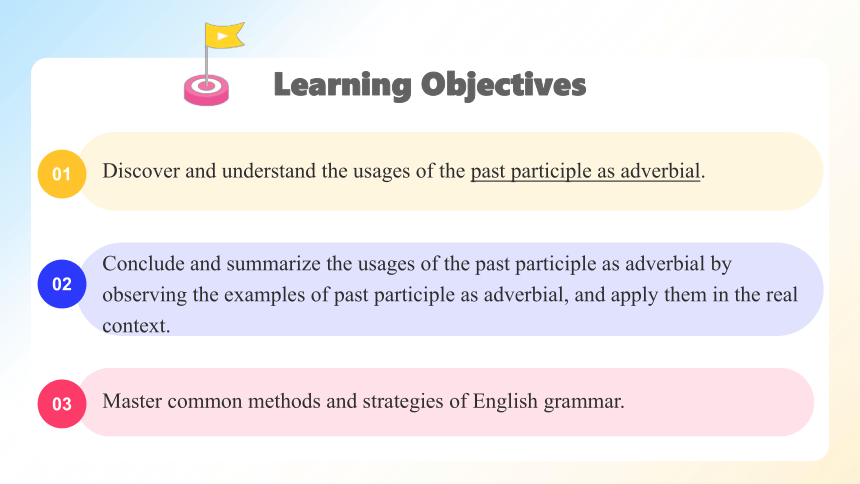
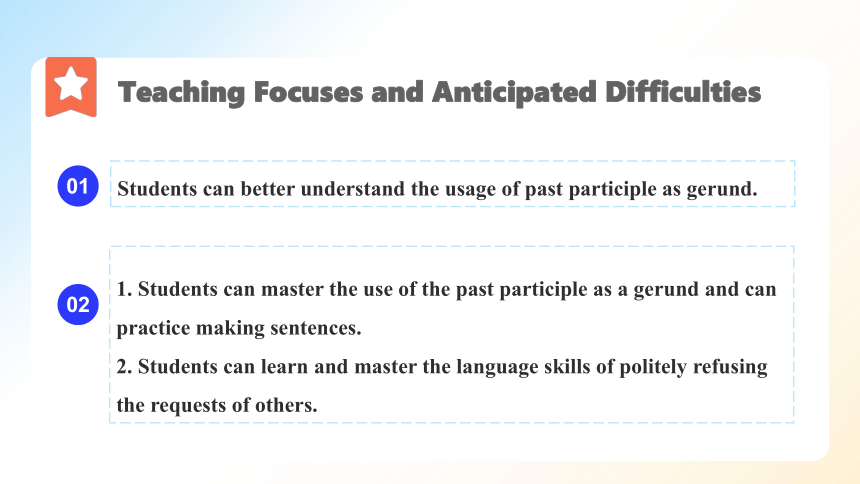
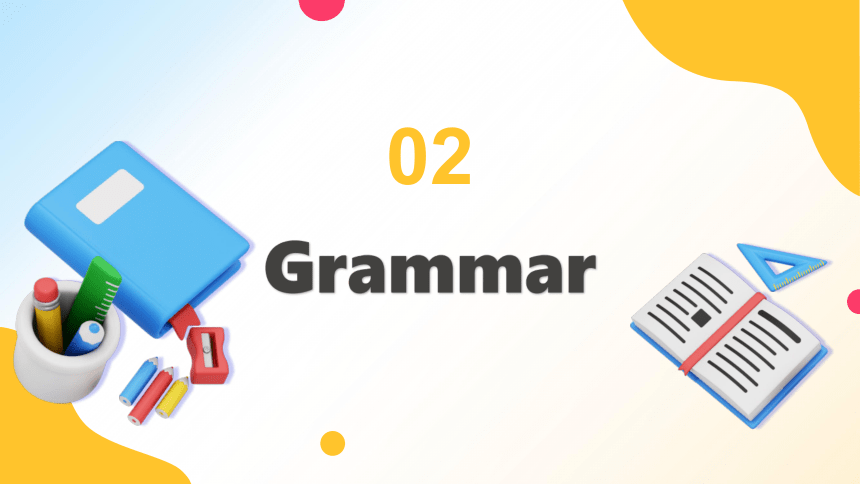
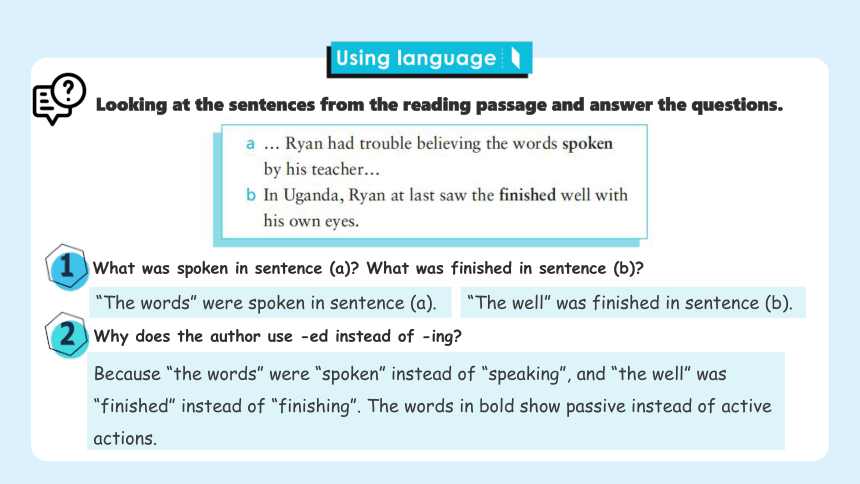
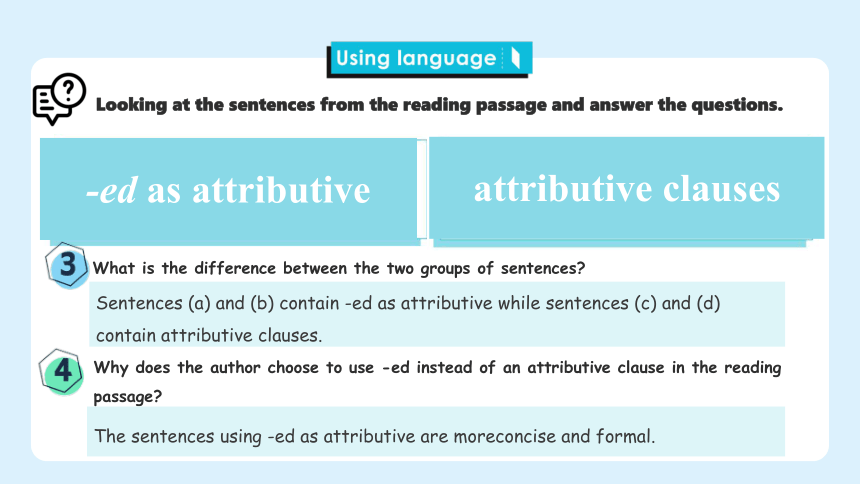
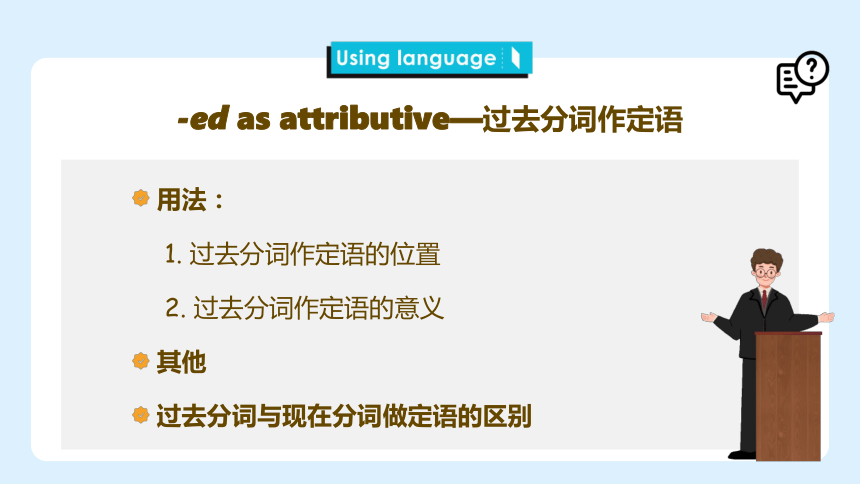

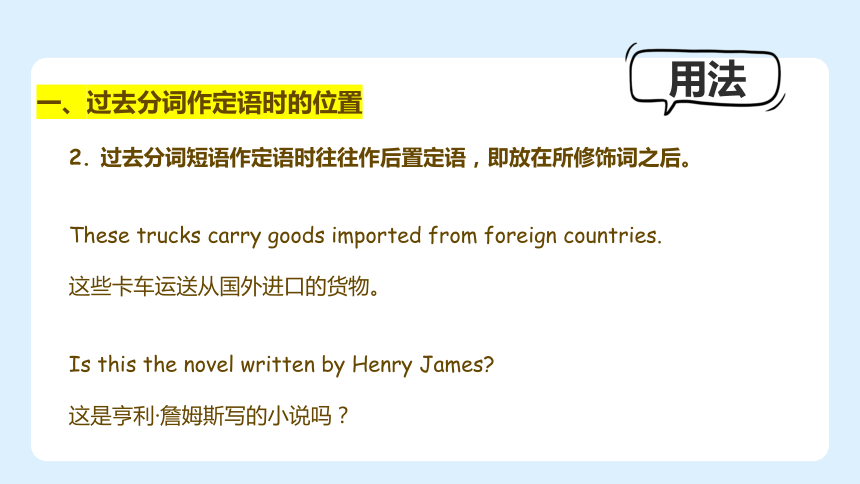
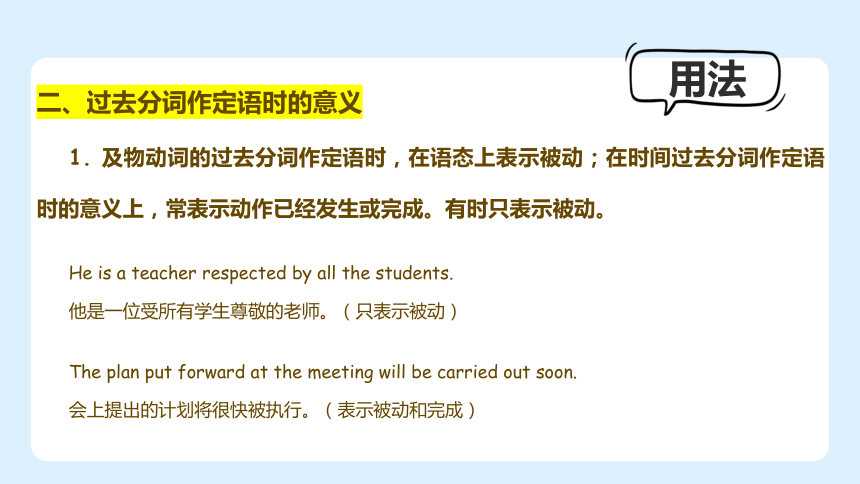
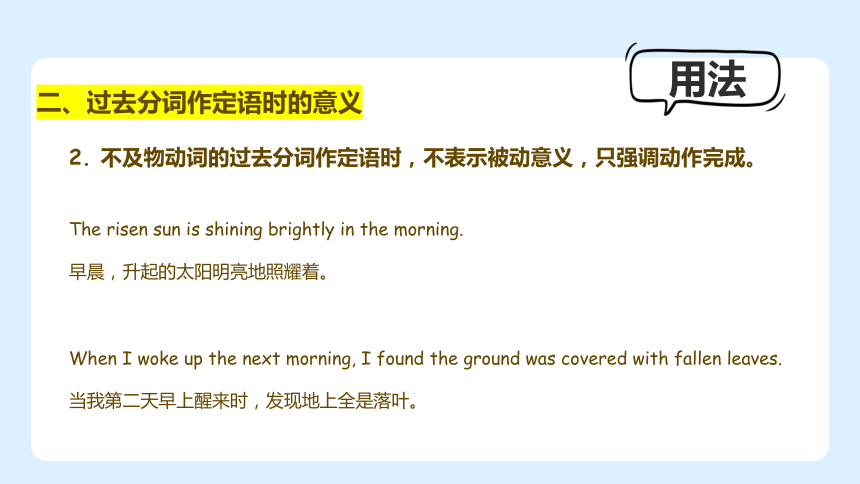
文档简介
(共40张PPT)
Unit 2
Making a difference
Learning Objectives
01
Learning Objectives
01
Discover and understand the usages of the past participle as adverbial.
03
Master common methods and strategies of English grammar.
02
Conclude and summarize the usages of the past participle as adverbial by observing the examples of past participle as adverbial, and apply them in the real context.
Students can better understand the usage of past participle as gerund.
1. Students can master the use of the past participle as a gerund and can practice making sentences.
2. Students can learn and master the language skills of politely refusing the requests of others.
01
02
Teaching Focuses and Anticipated Difficulties
Grammar
02
Looking at the sentences from the reading passage and answer the questions.
What was spoken in sentence (a) What was finished in sentence (b)
Why does the author use -ed instead of -ing
Because “the words” were “spoken” instead of “speaking”, and “the well” was “finished” instead of “finishing”. The words in bold show passive instead of active actions.
“The words” were spoken in sentence (a).
“The well” was finished in sentence (b).
Looking at the sentences from the reading passage and answer the questions.
What is the difference between the two groups of sentences
Why does the author choose to use -ed instead of an attributive clause in the reading passage
The sentences using -ed as attributive are moreconcise and formal.
Sentences (a) and (b) contain -ed as attributive while sentences (c) and (d) contain attributive clauses.
-ed as attributive
attributive clauses
-ed as attributive—过去分词作定语
用法:
1. 过去分词作定语的位置
2. 过去分词作定语的意义
其他
过去分词与现在分词做定语的区别
一、 过去分词作定语时的位置
1. 一般情况下,单个的过去分词作前置定语,即放在所修饰词之前。
The recovered animals will be released soon.
痊愈的动物很快会被放走。
有些过去分词表示特定含义时,单独作定语要放在所修饰的名词之后,如left(剩余的)。
There were a couple of seats left at the back. 后面还剩几个位子。
如果被修饰的词是指示代词 those 或 something,everything,anything,nothing, nobody等不定代词时,单个的过去分词作定语要放在这些词的后面。
He is one of those invited. 他是那些被邀请的人之一。
用法
一、过去分词作定语时的位置
2. 过去分词短语作定语时往往作后置定语,即放在所修饰词之后。
These trucks carry goods imported from foreign countries.
这些卡车运送从国外进口的货物。
Is this the novel written by Henry James
这是亨利·詹姆斯写的小说吗?
用法
二、过去分词作定语时的意义
1. 及物动词的过去分词作定语时,在语态上表示被动;在时间过去分词作定语时的意义上,常表示动作已经发生或完成。有时只表示被动。
He is a teacher respected by all the students.
他是一位受所有学生尊敬的老师。(只表示被动)
The plan put forward at the meeting will be carried out soon.
会上提出的计划将很快被执行。(表示被动和完成)
用法
二、过去分词作定语时的意义
2. 不及物动词的过去分词作定语时,不表示被动意义,只强调动作完成。
The risen sun is shining brightly in the morning.
早晨,升起的太阳明亮地照耀着。
When I woke up the next morning, I found the ground was covered with fallen leaves.
当我第二天早上醒来时,发现地上全是落叶。
用法
区分
过去分词 & 现在分词 做定语的区别
语态意义 时态意义
过去分词 被动 已完成
现在分词 主动 正在进行
区分
过去分词、现在分词的被动式与动词不定式作定语的区别
形式 语态意义 时态意义
过去分词 done 被动 已完成
现在分词的被动式 being done 被动 正在进行
动词不定式的被动式 to be done 被动 尚未发生
Exercise
1. ____________ (disappoint) by his behaviour, I said all this to my best friend.
2. _______ (treat) this way, you're sure to feel hurt –we should always be able to trust those closest to us, and it hurts even more when we find we can't.
3. ___________ (approach) in this way, your friendship will soon be repaired.
4. _______ (fill) with anger, you tend to say whatever comes to your mind.
Disappointed
Treated
Approached
Filled
1. extend
extend for/into/over
extend sth. for/by/until
extend sth. to sb./sth.
extend sth. to sb.
练习: 尼罗河一直往南延伸至维多利亚湖。
The River Nile ________________ south as Lake Victoria.
extends as far
延续
把……延长至……
把……扩大到……
提供/给予某人某事物
2. generous
be generous to sb.
be generous with sth.
be generous in doing sth.
generously
generosity
练习:
Hopefully, leaders worldwide will recognize the tough situation and contribution __________ (generous) to control the locust (蝗虫) outbreak.
generosity
对某人是慷慨的
在某方面是慷慨的
慷慨地做某事
adv. 慷慨地;大方地
n. 慷慨;大方;宽宏大量
3. hesitate
hesitate to do sth.
hesitate about/over sth.
hesitant
hesitation
without hesitation
have no hesitation in doing sth.
do sth. without hesitation
练习:The help you give to others will be paid back, so never hesitate ________ (offer) a helping
to offer
犹豫做某事
对某事犹豫不决
adj. 犹豫的
n. 犹豫;踌躇
毫不犹豫
毫不犹豫做某事
毫不犹豫做某事
4. confirmation
confirm
confirm sth./that… /wh-从句
be confirmed…
It is confirmed that…
be confirmed (as…)
练习:
I'm still waiting for _____________ (confirm) of the test results.
confirmation
vt. 证实,证明,确认;使确信;批准,认可
证明/表明/确认……
被证实/被证明……
据证实……
被认可
5. assistance
give assistance to sb.
come to one's assistance
with the assistance of...
be of assistance
assist
assistant
练习:
He gave ___________ to me when I was in trouble.
assistance
帮助某人
帮助某人
在......的帮助下
有帮助
v. 帮助,协助
n. 助手,助理 adj. 助理的,副的
6. volunteer
volunteer to do sth.
voluntary
voluntarily
do voluntary work
练习:As a _________, he often does __________ work, and he thinks it's his responsibility to _________ to help those in need.
volunteer
自愿做某事
adj.自愿的,主动的,志愿的
adv.自愿地,主动地
做志愿工作
voluntary
volunteer
Activity 2
Read the discussion about Ryan’s foundation. Rewrite the underlined sentences using the -ed form.
Ryan is a young man who is admired by a lot of people. The money which is raised by his foundation supports schools and communities in Africa. I think digging wells for drinking water is a good way to solve the problem of water shortage.
Ryan is a young man admired by a lot of people. The money raised by his foundation supports schools and communities in Africa.
Activity 2
Read the discussion about Ryan’s foundation. Rewrite the underlined sentences using the -ed form.
As in the words spoken by Ryan, we need to not only donate money but also get new ideas. I think the support needed includes new technology for recycling water and education on how to use and save water.
I absolutely agree with you. Digging wells is a good way, but not the only way, to solve the problem of water shortage in Africa. As in the words which were spoken by Ryan, we need to not only donate money but also get new ideas. I think the support which is needed includes new technology for recycling water and education on how to use and save water.
Activity 3
Read the passage and choose the correct form of the words
The United Nations Children’s Fund, also knowing / known as UNICEF, is a United Nations (UN) organisation basing / based in New York. It offers help needing / needed by children all over the world.
联合国儿童基金会
Activity 3
Read the passage and choose the correct form of the words
UNICEF was founded on 11 December 1946, to provide food and healthcare to children in countries damaging / damaged in World War II. Since 1953, UNICEF has taken up an extended mission to help children in the developing / developed world, including those living / lived with diseases or disabilities, and those affecting / affected by rapid modernisation and environmental problems. Now, UNICEF has been working to improve the lives of children and their families across 190 countries and territories.
Activity 4
Read the descriptions and underline the words that describe personal qualities.
Activity 5
Put the words you underlined in Activity 4 into the table. Add any more you can think of.
positive
independent
generous
honest
confident
creative
easygoing
loyal
intelligent
determined
warmhearted
straightforward
neutral
sensitive
serious
bookish
shy
self-conscious
strict
negative
nervous
lazy
shortsighted
selfish
mean
slack
Activity 7
Work in pairs.
Talk about people’s personal qualities using the words you have learnt.
A: I think my cousin is very brave.
B: Why do you think so
A: …
The topic should be centered around a character.
You can choose your favorite person, the most familiar person, the most admired person, the most characteristic person, etc.
To be a volunteer
Activity 7
Listen to three conversations and match the pictures.
D
A
C
Activity 8
Listen again and complete the table.
working with children
riding horses
have fun
still enjoy sports
one on one
build a relationship
with them
as a volunteer
reference from someone
who knows you
Activity 9
Work in pairs. Act out a telephone enquiry.
student A
You’re interested in taking up voluntary work about environmental protection, and you’re going to make a telephone enquiry about it. Information you’d like to know:
what kind of work is available
the responsibilities of the work
the requirements on you
the person to contact
Activity 9
student B
You work at a volunteer centre. Your job is to answer enquiries about voluntary work and give practical step-by-step advice on how to get started. The voluntary work you recommend is coastal clean-up at North Beach.
Responsibilities:
collect waste from the beach
stop people from littering the beach and the ocean
record the waste and write reports
Requirements:
fill in the registration form
provide a letter of recommendation
think about the time you want to help out
Contact: Mr Brown, Tel. 012 3481 2177
Exercise
03
Exercise
1. Nobody knows the topic ___________(discuss) tomorrow.
2. In the past, some people used ___________(train) monkeys to make money.
3. In some languages, 100 words make up hall of all words ___________(use) in daily conversations.
4. You cannot accept an opinion ___________(offer) to you unless it is based on facts.
5.__________(look) into the house, she found the flowers __________(buy)by her mother.
to be discussed
trained
used
offered
Looking
bought
Summary
04
教学实施方案
Homework
05
Homework
1. Think about other voluntary work you would like to be involved in, and have a similar conversation;
2. summarise what we have learnt in this lesson;
3. prepare for the next lesson
See you
next class!
Unit 2
Making a difference
Learning Objectives
01
Learning Objectives
01
Discover and understand the usages of the past participle as adverbial.
03
Master common methods and strategies of English grammar.
02
Conclude and summarize the usages of the past participle as adverbial by observing the examples of past participle as adverbial, and apply them in the real context.
Students can better understand the usage of past participle as gerund.
1. Students can master the use of the past participle as a gerund and can practice making sentences.
2. Students can learn and master the language skills of politely refusing the requests of others.
01
02
Teaching Focuses and Anticipated Difficulties
Grammar
02
Looking at the sentences from the reading passage and answer the questions.
What was spoken in sentence (a) What was finished in sentence (b)
Why does the author use -ed instead of -ing
Because “the words” were “spoken” instead of “speaking”, and “the well” was “finished” instead of “finishing”. The words in bold show passive instead of active actions.
“The words” were spoken in sentence (a).
“The well” was finished in sentence (b).
Looking at the sentences from the reading passage and answer the questions.
What is the difference between the two groups of sentences
Why does the author choose to use -ed instead of an attributive clause in the reading passage
The sentences using -ed as attributive are moreconcise and formal.
Sentences (a) and (b) contain -ed as attributive while sentences (c) and (d) contain attributive clauses.
-ed as attributive
attributive clauses
-ed as attributive—过去分词作定语
用法:
1. 过去分词作定语的位置
2. 过去分词作定语的意义
其他
过去分词与现在分词做定语的区别
一、 过去分词作定语时的位置
1. 一般情况下,单个的过去分词作前置定语,即放在所修饰词之前。
The recovered animals will be released soon.
痊愈的动物很快会被放走。
有些过去分词表示特定含义时,单独作定语要放在所修饰的名词之后,如left(剩余的)。
There were a couple of seats left at the back. 后面还剩几个位子。
如果被修饰的词是指示代词 those 或 something,everything,anything,nothing, nobody等不定代词时,单个的过去分词作定语要放在这些词的后面。
He is one of those invited. 他是那些被邀请的人之一。
用法
一、过去分词作定语时的位置
2. 过去分词短语作定语时往往作后置定语,即放在所修饰词之后。
These trucks carry goods imported from foreign countries.
这些卡车运送从国外进口的货物。
Is this the novel written by Henry James
这是亨利·詹姆斯写的小说吗?
用法
二、过去分词作定语时的意义
1. 及物动词的过去分词作定语时,在语态上表示被动;在时间过去分词作定语时的意义上,常表示动作已经发生或完成。有时只表示被动。
He is a teacher respected by all the students.
他是一位受所有学生尊敬的老师。(只表示被动)
The plan put forward at the meeting will be carried out soon.
会上提出的计划将很快被执行。(表示被动和完成)
用法
二、过去分词作定语时的意义
2. 不及物动词的过去分词作定语时,不表示被动意义,只强调动作完成。
The risen sun is shining brightly in the morning.
早晨,升起的太阳明亮地照耀着。
When I woke up the next morning, I found the ground was covered with fallen leaves.
当我第二天早上醒来时,发现地上全是落叶。
用法
区分
过去分词 & 现在分词 做定语的区别
语态意义 时态意义
过去分词 被动 已完成
现在分词 主动 正在进行
区分
过去分词、现在分词的被动式与动词不定式作定语的区别
形式 语态意义 时态意义
过去分词 done 被动 已完成
现在分词的被动式 being done 被动 正在进行
动词不定式的被动式 to be done 被动 尚未发生
Exercise
1. ____________ (disappoint) by his behaviour, I said all this to my best friend.
2. _______ (treat) this way, you're sure to feel hurt –we should always be able to trust those closest to us, and it hurts even more when we find we can't.
3. ___________ (approach) in this way, your friendship will soon be repaired.
4. _______ (fill) with anger, you tend to say whatever comes to your mind.
Disappointed
Treated
Approached
Filled
1. extend
extend for/into/over
extend sth. for/by/until
extend sth. to sb./sth.
extend sth. to sb.
练习: 尼罗河一直往南延伸至维多利亚湖。
The River Nile ________________ south as Lake Victoria.
extends as far
延续
把……延长至……
把……扩大到……
提供/给予某人某事物
2. generous
be generous to sb.
be generous with sth.
be generous in doing sth.
generously
generosity
练习:
Hopefully, leaders worldwide will recognize the tough situation and contribution __________ (generous) to control the locust (蝗虫) outbreak.
generosity
对某人是慷慨的
在某方面是慷慨的
慷慨地做某事
adv. 慷慨地;大方地
n. 慷慨;大方;宽宏大量
3. hesitate
hesitate to do sth.
hesitate about/over sth.
hesitant
hesitation
without hesitation
have no hesitation in doing sth.
do sth. without hesitation
练习:The help you give to others will be paid back, so never hesitate ________ (offer) a helping
to offer
犹豫做某事
对某事犹豫不决
adj. 犹豫的
n. 犹豫;踌躇
毫不犹豫
毫不犹豫做某事
毫不犹豫做某事
4. confirmation
confirm
confirm sth./that… /wh-从句
be confirmed…
It is confirmed that…
be confirmed (as…)
练习:
I'm still waiting for _____________ (confirm) of the test results.
confirmation
vt. 证实,证明,确认;使确信;批准,认可
证明/表明/确认……
被证实/被证明……
据证实……
被认可
5. assistance
give assistance to sb.
come to one's assistance
with the assistance of...
be of assistance
assist
assistant
练习:
He gave ___________ to me when I was in trouble.
assistance
帮助某人
帮助某人
在......的帮助下
有帮助
v. 帮助,协助
n. 助手,助理 adj. 助理的,副的
6. volunteer
volunteer to do sth.
voluntary
voluntarily
do voluntary work
练习:As a _________, he often does __________ work, and he thinks it's his responsibility to _________ to help those in need.
volunteer
自愿做某事
adj.自愿的,主动的,志愿的
adv.自愿地,主动地
做志愿工作
voluntary
volunteer
Activity 2
Read the discussion about Ryan’s foundation. Rewrite the underlined sentences using the -ed form.
Ryan is a young man who is admired by a lot of people. The money which is raised by his foundation supports schools and communities in Africa. I think digging wells for drinking water is a good way to solve the problem of water shortage.
Ryan is a young man admired by a lot of people. The money raised by his foundation supports schools and communities in Africa.
Activity 2
Read the discussion about Ryan’s foundation. Rewrite the underlined sentences using the -ed form.
As in the words spoken by Ryan, we need to not only donate money but also get new ideas. I think the support needed includes new technology for recycling water and education on how to use and save water.
I absolutely agree with you. Digging wells is a good way, but not the only way, to solve the problem of water shortage in Africa. As in the words which were spoken by Ryan, we need to not only donate money but also get new ideas. I think the support which is needed includes new technology for recycling water and education on how to use and save water.
Activity 3
Read the passage and choose the correct form of the words
The United Nations Children’s Fund, also knowing / known as UNICEF, is a United Nations (UN) organisation basing / based in New York. It offers help needing / needed by children all over the world.
联合国儿童基金会
Activity 3
Read the passage and choose the correct form of the words
UNICEF was founded on 11 December 1946, to provide food and healthcare to children in countries damaging / damaged in World War II. Since 1953, UNICEF has taken up an extended mission to help children in the developing / developed world, including those living / lived with diseases or disabilities, and those affecting / affected by rapid modernisation and environmental problems. Now, UNICEF has been working to improve the lives of children and their families across 190 countries and territories.
Activity 4
Read the descriptions and underline the words that describe personal qualities.
Activity 5
Put the words you underlined in Activity 4 into the table. Add any more you can think of.
positive
independent
generous
honest
confident
creative
easygoing
loyal
intelligent
determined
warmhearted
straightforward
neutral
sensitive
serious
bookish
shy
self-conscious
strict
negative
nervous
lazy
shortsighted
selfish
mean
slack
Activity 7
Work in pairs.
Talk about people’s personal qualities using the words you have learnt.
A: I think my cousin is very brave.
B: Why do you think so
A: …
The topic should be centered around a character.
You can choose your favorite person, the most familiar person, the most admired person, the most characteristic person, etc.
To be a volunteer
Activity 7
Listen to three conversations and match the pictures.
D
A
C
Activity 8
Listen again and complete the table.
working with children
riding horses
have fun
still enjoy sports
one on one
build a relationship
with them
as a volunteer
reference from someone
who knows you
Activity 9
Work in pairs. Act out a telephone enquiry.
student A
You’re interested in taking up voluntary work about environmental protection, and you’re going to make a telephone enquiry about it. Information you’d like to know:
what kind of work is available
the responsibilities of the work
the requirements on you
the person to contact
Activity 9
student B
You work at a volunteer centre. Your job is to answer enquiries about voluntary work and give practical step-by-step advice on how to get started. The voluntary work you recommend is coastal clean-up at North Beach.
Responsibilities:
collect waste from the beach
stop people from littering the beach and the ocean
record the waste and write reports
Requirements:
fill in the registration form
provide a letter of recommendation
think about the time you want to help out
Contact: Mr Brown, Tel. 012 3481 2177
Exercise
03
Exercise
1. Nobody knows the topic ___________(discuss) tomorrow.
2. In the past, some people used ___________(train) monkeys to make money.
3. In some languages, 100 words make up hall of all words ___________(use) in daily conversations.
4. You cannot accept an opinion ___________(offer) to you unless it is based on facts.
5.__________(look) into the house, she found the flowers __________(buy)by her mother.
to be discussed
trained
used
offered
Looking
bought
Summary
04
教学实施方案
Homework
05
Homework
1. Think about other voluntary work you would like to be involved in, and have a similar conversation;
2. summarise what we have learnt in this lesson;
3. prepare for the next lesson
See you
next class!
